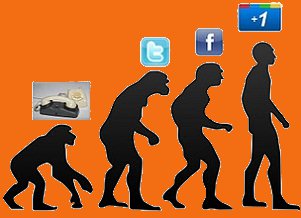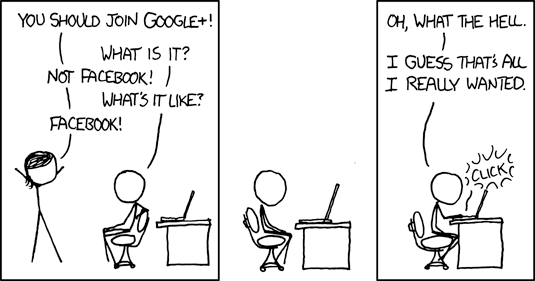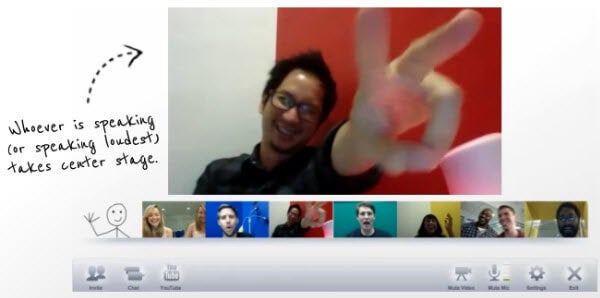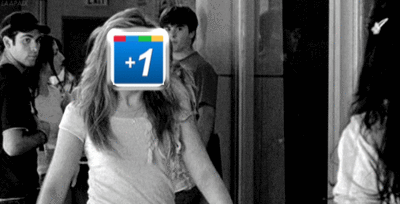Google+ is Awesome. Facebook Maimed, Twitter Mortally Wounded?

Share
I´ve spent the last week playing with the new Google+, and I´m here to tell you the service is pretty damn awesome. Dozens of Silicon Valley startups, especially social behemoths Facebook and Twitter, must have had some pretty fun meetings over the last several days. The title of the meetings: how the f*ck are we going to defend ourselves against this incredibly daunting offensive from the big G? I´m not sure if they can.
Social Networking Improved?
Google+ is like Facebook. The interface looks almost identical, with the classic three column homepage seen in Facebook. But the differences start to kick in immediately when you try to make friends.
In Facebook, you cannot friend someone unless they friend you back. And once that person does friend you, for the most part they see all of your updates and you see all of their updates. The result is a privacy nightmare and a news feed filled with everybody´s junk. Most of us have not fully appreciated these glaring problems at Facebook because until Google+ came around there was no other game in town to show us how bad they were. Now we know better.
Instead of treating all of your friends as equals, Google lets you put them into different groups, called circles, such as "friends", "acquaintances", "family", "sports fans", and so on. These circles represent a powerful innovation. They allow us to send more personal updates just to our closest friends instead of forcing us to share with all of our hundreds of acquaintances. This simple task is not easy to do within Facebook. Furthermore, Google+ allows us to chop up our incoming news stream based on what circle they are coming from, so that we can focus on just the updates from our family or just the updates from our coworkers.
The Google+ circles concept is powerful and easy to use. It represents the defining, foundational difference between Google´s and Facebook´s vision for social networking. If this new model takes off with users, then Facebook will find itself in the uncomfortable position of having to replicate these features within its own platform. Unfortunately for Facebook, moving to this new paradigm will not be possible overnight. We are talking about a major architectural overhaul (update: I mean major as in the backend and more importantly the UI. It will probably be hard for Facebook to integrate this model into their UI in a way that is intuitive and widely adopted by users). In the meantime, Google will have a chance to attract significant numbers of users and influence.
Privacy Granted
Each of us on average has hundreds of friends on Facebook. When you share things on Facebook, you have to share it with all of them! How stupid is that? Therein lies Facebook´s infamous inability to solve the privacy problem.
When faced with the decision to share with all of our Facebook "friends", or not to share at all, most of us have chosen to throw our privacy concerns out the door and to share. Meanwhile, tens of millions of people unwilling to give up their privacy have been forced to do the opposite - they have refrained from using Facebook entirely, and have missed out on the utility and fun to be had from social networking.
With Google+ we get our privacy back. We can share an update with one single person if we like. We can share it with any arbitrary circle of friends that we designate. We can even share an update with anyone in the world and make it searchable across the web, simply by marking it "public". We have been liberated to share our digital lives with the same granularity of privacy we experience in the real world. That is a good thing. We will share more now that we don´t have to share with everyone, and we will share the right things with the right people.
Following People That Aren´t Friends (AKA Twitter Is Screwed!)
One of the most powerful aspects of Google+ that is completely absent from Facebook is the ability to follow the updates of people that you aren´t "friends" with at all (Facebook approximates this with "pages", but this isn´t quite the same). In Facebook, you get to see all of a person´s updates or none of them. There is no in between. In contrast, with Google+ you can follow absolutely anyone you like, and they don´t have to approve it or follow you back. This takes away the awkwardness of having to confirm or deny someone as a "friend", but more importantly allows for assymetric sharing. The result is a Twitter-like functionality, allowing you to see the updates from people that are interesting to you, such as celebrities, politicians, photographers, and so on. We can follow other people´s updates (well, at least the ones that they mark as "public"), even if they are not following ours. Users are already scrambling to acquire Google+ followers, an extremely valuable asset in the world of online marketing and influence.
I would not want to be in Twitter´s shoes right now. Google has taken Twitter´s follow model and seamlessly integrated it into Google+. But Google+ seems to offer everything Twitter offers and much, much more. With Google+ you can broadcast to your hordes of followers, just as with Twitter, but you are no longer limited to 140 characters. You are also no longer limited to characters alone! You can share videos, images, etc. And now discussions can blossom around your content in a way that is not nearly as flexible with Twitter. Google+ is Twitter on steroids. Google+ allows you to send a much richer set of information to your followers, and it allows them to interact with you and each other around that content. Will Facebook be forced to follow Google´s lead on this?
Going in Twitter´s favor, however, is its simplicity. Twitter does one thing (allows you to follow people) and it does that one thing well. Perhaps that simplicity will win out in the end? Coincidentally (or not!) it was revealed yesterday that Twitter and Google have discontinued their agreement in which Google paid Twitter a substantial fee to include the Twitter stream in Google search results. Go ahead and add another minus for Twitter.
Social Streams Filled With Junk - Not Anymore!
Not only has Google+ addressed the privacy problem, but they have also taken a big whack at the insane junk problem that is all too common on Facebook. Do any of these problems afflict your news feed within Facebook?
- You have hundreds of friends, but your news feed is always filled up with nonsense from the same 5 friends that seem to send an update every other minute
- All of your hundreds of Facebook friends get equal ability to dominate your news feed with their updates, regardless of how important they are to you as individuals
- There is no EASY way to slice and dice the updates coming into your news feed by topic or who they are coming from (I emphasize easy, because with Facebook lists you can mostly do this, but the feature is not integral to the platform, and thus most users don´t know about it or use it)
With Google+ the problems above are mostly resolved. When people share something about sports, they might only share it with their sports buddies, and save their other 490 friends from seeing more irrelevant junk in their news feeds. Not only will the updates coming our way be more targeted, but we will also be able to chop up this incoming stream of updates based on who it is coming from. Google+ lets you take your incoming news stream and see only the parts that come from people that you have designated as close family, or science friends, or whatever. Say goodbye to the overwhelming mess of a news feed that we see in Facebook. Google+ just made news feeds much better.
Lets Hangout On Google+
Google+ offers too many new and innovative features to the social networking mix to practically list here. One impressive feature that cannot be ignored, however, is something called a Hangout, in which you can invite one or more of your circles to join you in a chat room. The room is enabled with both text chat and video chat and the feature is just totally killer. Hangouts also serve as a virtual movie theater where you and your friends can watch youtube videos together as a group. Hangouts add a whole new meaning to the "social" aspect of social networking. Facebook will likely attempt to replicate this feature soon, but even with help from Skype I think it will take them a while to replicate it well.
Tools such as Skype, Gmail, Tinychat, and even the infamous Chatroullete have offered text and video chat for many years. So why are Google´s Hangouts so important, and so notable? The difference is twofold. First, the implementation from a technical and user interface perspective is top notch. Hangouts are easy to use, and they work great. Second, and more importantly, this is the first time that group text and video chat has been combined directly into a social network on a large scale. Chatting with a group of people is by definition a social activity. Combining this activity with a social network introduces all of the trappings of socialization that we expect as humans. A critical mass of the "right" people is present on the network, and enough of them are online when you are there to produce a meaningful gathering. Furthermore, the Hangout offers users the ability to enter and leave the gathering on their own terms, avoiding the awkwardness and inconvenience of having to ask someone directly to enter or (gasp!) leave the chat.
Beyond these practical attributes, Hangouts offer a feature that is currently unparalleled in the digital universe: the ability to converse with a person of interest, such as a celebrity or scholar, that you aren´t necessarily friends with. It is up to each celebrity to decide how often and with whom they will initiate Hangouts. But already in these early days of Google+ it has become common for people of interest, such as Google´s Vic Gundotra, to initiate a Hangout with the first 20 random people that choose to join (20 people is currently the maximum Hangout size). Google´s Hangouts offer us the ability to hang out with friends, celebrities, and people of interest, no matter where we are physically in the world. That is pretty awesome!
Be Part of the Future
Sign up to receive top stories about groundbreaking technologies and visionary thinkers from SingularityHub.


Monopoly No More
Facebook, with nearly 1 billion users and an enormous advantage in terms of features won´t be dethroned overnight. The end game is impossible to foresee, but one thing seems likely: Facebook´s winner-take-all monopoly position in the social networking space is probably over. That is an unbelievable change in perspective from just one week ago.
The biggest winners here are the users, for now it looks as if we will have not one, but two major social networks to choose from in the future. While Google+ lacks a mountain of features and 3rd party applications compared to Facebook, it also offers quite a few awesome features of its own that Facebook DOES NOT offer. To compete with its new rival, Facebook will be forced to up its game, and innovate faster.
More importantly, we can hope that Facebook will eventually be forced to treat its users better. Several reports indicate that Facebook is in a panic over the Google+ phenomenon, and is reacting by squeezing users´ability to take their friends with them to Google+. This is exactly the sort of anti-user behavior we all loathe from Facebook. As a former Google employee, I am biased, but still I feel Google is a much more responsible and trustworthy guardian of our personal data than Facebook. We need look no further than Google Takeout to see Google´s refreshingly positive attitude towards users.
The slower Facebook moves to counter the Google+ threat, the more power, users, and influence it will lose to Google+. Already a trickle of users are choosing to close their Facebook accounts for good in favor of the new Google+.
Where Do We Go From Here?
For all its strengths, Google+ is still missing quite a bit of Facebook´s magic. Google+ currently offers no platform for third party developers to create awesome games like Farmville, widgets, utilities, and the nearly unlimited features that we have come to love and expect from Facebook. Google+ does not have Facebook´s digital currency, known as Facebook Credits. Google+ does not have advertising. Google+ does not offer corporations, interest groups, and other entities the ability to create dedicated landing pages. Most importantly, Google+ only has on the order of hundreds of thousands of users, vs Facebook´s hundreds of millions!
Clearly Google+ has a long way to go to compete with the Facebook incumbent. And yet Google+ has quite a bit of mojo of its own that Facebook does not have. In the coming year we will see Facebook copy many of Google+´s innovations, while Google+ will likely roll out every single one of the missing components just mentioned. One year from now, we will likely have two social networks that are similar in many ways, and if Google+ proves compelling enough it might even close the user gap significantly.
Yet Google+ has a secret weapon that even the mighty Facebook will be hard pressed to combat over the long run. That secret weapon is everything that Google has that is not Google+. A formidable armada of Google products including Gmail, Picasa, Calendar, Docs, Maps, Search, News, Youtube, Chrome Web Browser, Blogger, Translation, Android, and more stands at the ready to assist and join Google+ in the battle for the future of social networking. These products are best in class, extremely difficult to replicate, and are used by more than a billion people across the planet. As these products are seamlessly integrated with Google+, we are about to witness an incredible two way explosion of value and utility. Google´s products will gain all of the powerful attributes that social networks deliver - virality, discovery, crowdsourcing, sharing, "liking", and so much more. Meanwhile, Google+ will be given a steroid boost of products that deliver content, tools, and capabilities to its hungry hordes of social minions.
Google users are already being given a taste of this integration with a new unified user interface that is being rolled out across nearly all Google products at this very moment. A black status bar is plastered across the top of Gmail and other products, giving users instant Google+ updates and one click access to Google+ at all times. Many users have noted that getting updates from Google+ is quite pleasing and addictive, and thus Google+ looks to become extremely sticky with users. Google products are also getting a new look and feel that is consistent across all products and within Google+. This consistency everywhere gives users the comfort and familiarity of always being in the same ecosystem no matter where they are within the Google universe.
For all the wonder and power that Google+ appears to offer, it is yet to be seen how big of a hit it will be with users. The Google circles paradigm might not resonate with users as well as Google hopes and users may fail to show up in large enough numbers. I´m betting, however, that users will indeed enjoy the new Google+ quite a bit. Myspace cofounder Tom Anderson recently gained attention with his own positive opinion (but really what does he know?). The stock market, however, is definitely giving Google an initial plus. Google´s stock is up on the order of 12% since Google+ was first launched.
If Google+ does indeed take off, Twitter would appear to be in some serious trouble, and hundreds of other Silicon Valley darlings are likely to become obsolete. On the flip side, thousands of new ideas and startups will be given a new platform and partner with which to make their mark on the world.
For Facebook, the launch of Google+ is a wake up call to innovate even faster, and a mandate to treat users and their privacy better. Facebook is a nimble company, with tons of smart people and they won´t take this new threat lying down. But the threat is real, and it appears to be a powerful one. Facebook will have to scramble.
As for Google, the launch of Google+ is a shrewd move, especially for a company that has failed so poorly in the social space in the past. Google + is as much an effort to make Google´s own products better and more useful as it is an attempt to thwart the Facebook threat. As such, even if Google+ is unable to compete head on with Facebook, it is still likely to represent a big win for Google´s products and its users. I say plus to that.
Disclosure: I am a former employee of Google. I am an investor in both Google and Facebook
Update: we hope to get some google plus buttons installed on the site soon!
[Image Credits: Carsten Hoppe, xkcd, Josh Haley, Techonaut zapz`]
Related Articles

Scientists Send Secure Quantum Keys Over 62 Miles of Fiber—Without Trusted Devices

This Light-Powered AI Chip Is 100x Faster Than a Top Nvidia GPU

How Scientists Are Growing Computers From Human Brain Cells—and Why They Want to Keep Doing It
What we’re reading






